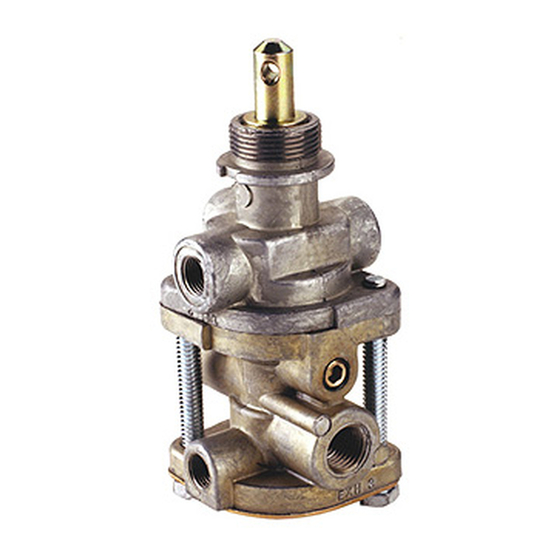- ページ 6
コントロールユニット BENDIX PP-7 TRAILER SUPPLY VALVEのPDF マニュアルをオンラインで閲覧またはダウンロードできます。BENDIX PP-7 TRAILER SUPPLY VALVE 6 ページ。 Trailer supply valve

10. Using a 7/16 inch wrench remove the special hex nut
(15) from the plunger inlet exhaust valve and washer.
11. Remove the plunger inlet exhaust valve (16) and washer.
12. Remove the plunger (17) and plunger return spring (18)
from the body.
13. Remove and discard the plunger o-ring (19).
CLEANING AND INSPECTION
1. Clean all metal parts in a good commercial solvent
making sure all ports, passages, and bores are clean
and open.
2. Dry the parts thoroughly and inspect the plunger and
piston bores for scratches and nicks.
3. It is recommended that all non-metallic parts and springs
be replaced, using only genuine Bendix replacements.
ASSEMBLY
GENERAL
Prior to assembly all internal bores and all non-metallic parts
should be coated with a film of silicone lubricant, Bendix
piece number 291126.
1. Install the control inlet exhaust valve (13) and return
spring (14) in the lower body.
2. Install the o-ring (12) in the body, then the o-ring retainer
(11) and the truarc retainer (10).
3. Install the end plate o-ring (5) in the oval groove in the
lower body.
4. Install the plunger o-ring (19) and place the plunger return
spring (18) and plunger (17) in the upper body.
5. Depress the plunger until the threaded portion extends
sufficiently to install the plunger inlet and exhaust valve
(16), the valve washer and special hex nut (15). Torque
the special hex nut to 30-40 inch pounds.
6. Install the square cut seal ring (3) in the upper body.
7. Install the large (8) and small diameter o-rings (9) on the
control piston (6).
8. Place the upper and lower bodies together taking care
to align the marks made during disassembly.
9. Install the control piston return spring (7) and control
piston in the lower body.
10. Install the end plate (4) on the lower body and secure it
with the two 1/4 inch-20 cap screws.
11. Torque the cap screws to 30-40 inch pounds.
12. Reinstall the rebuilt valve on the vehicle in the reverse
manner in which it was removed.
TESTING THE REBUILT VALVE
Test the rebuilt unit using the operation and leakage checks
outlined in this manual.
6
BW1579 © 2004 Bendix Commercial Vehicle Systems LLC. All rights reserved. 3/2004 Printed in U.S.A.
WARNING! PLEASE READ AND FOLLOW
THESE
INSTRUCTIONS
PERSONAL INJURY OR DEATH:
When working on or around a vehicle, the following
general precautions should be observed at all times.
1. Park the vehicle on a level surface, apply the
parking brakes, and always block the wheels.
Always wear safety glasses.
2. Stop the engine and remove ignition key when
working under or around the vehicle. When
working in the engine compartment, the engine
should be shut off and the ignition key should be
removed. Where circumstances require that the
engine be in operation, EXTREME CAUTION should
be used to prevent personal injury resulting from
contact with moving, rotating, leaking, heated or
electrically charged components.
3. Do not attempt to install, remove, disassemble or
assemble a component until you have read and
thoroughly understand the recommended
procedures. Use only the proper tools and observe
all precautions pertaining to use of those tools.
4. If the work is being performed on the vehicle's air
brake system, or any auxiliary pressurized air
systems, make certain to drain the air pressure from
all reservoirs before beginning ANY work on the
vehicle. If the vehicle is equipped with an AD-IS
air dryer system or a dryer reservoir module, be
sure to drain the purge reservoir.
5. Following
the
recommended procedures, deactivate the electrical
system in a manner that safely removes all
electrical power from the vehicle.
6. Never exceed manufacturer's recommended
pressures.
7. Never connect or disconnect a hose or line
containing pressure; it may whip. Never remove a
component or plug unless you are certain all
system pressure has been depleted.
8. Use only genuine Bendix
components and kits. Replacement hardware,
tubing, hose, fittings, etc. must be of equivalent
size, type and strength as original equipment and
be designed specifically for such applications and
systems.
9. Components with stripped threads or damaged
parts should be replaced rather than repaired. Do
not attempt repairs requiring machining or welding
unless specifically stated and approved by the
vehicle and component manufacturer.
10. Prior to returning the vehicle to service, make
certain all components and systems are restored
to their proper operating condition.
TO
AVOID
vehicle
manufacturer's
®
replacement parts,
™
